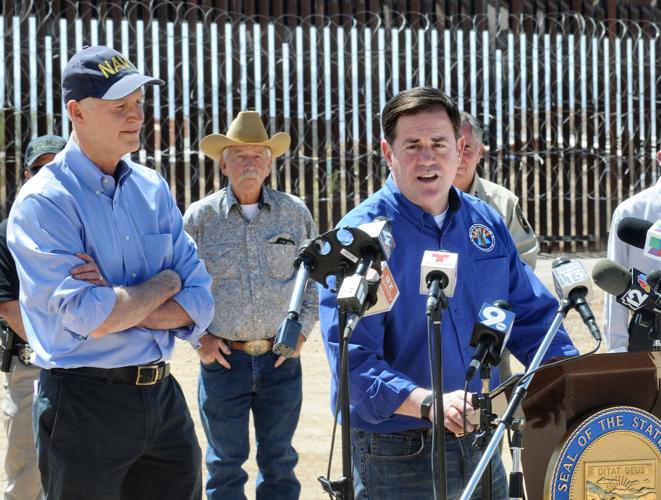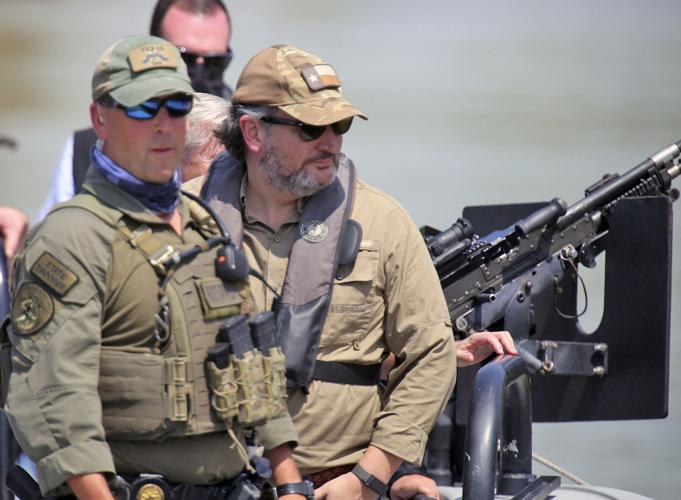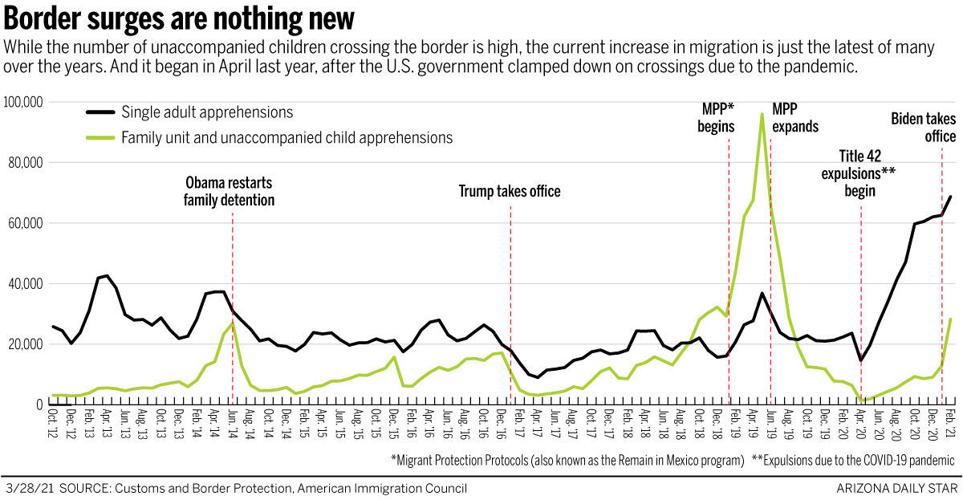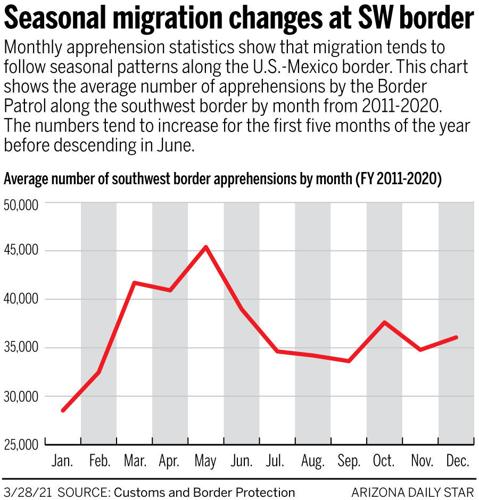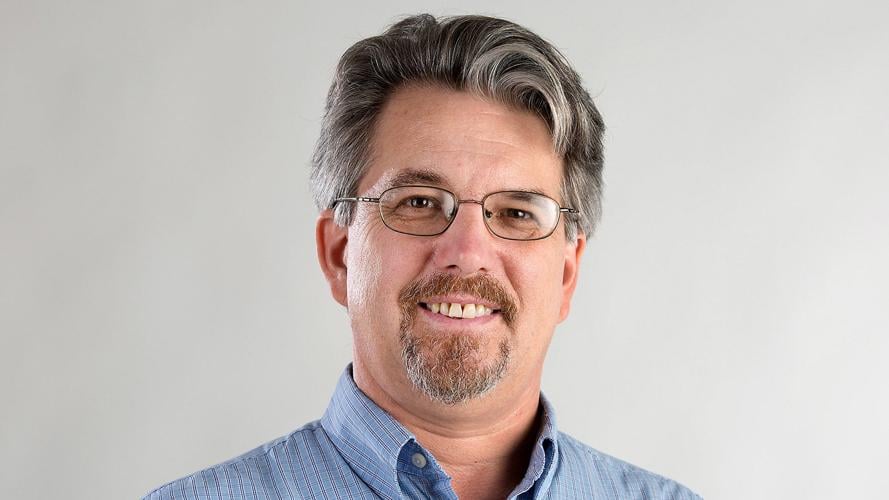Politicians find the border backdrop irresistible.
That’s why you saw Gov. Doug Ducey standing in front of the border barrier in Douglas during a March 19 press conference, accompanied by Sen. Rick Scott from Florida.
That’s why Sen. Ted Cruz was prowling along the Rio Grande at midnight Friday with a passel of other Republican senators, who claimed to have been “heckled” by “cartel members” on the other side of the river.
But the border backdrop is just the familiar set for a plot some politicians eagerly play out time and again. These days, we’re seeing another stage remake of the “Border Crisis” dramas we’ve seen so many times before.
Yes, there are real problems occurring in some places along the U.S.-Mexico border now. Many more families and unaccompanied children are seeking refuge in the United States than were crossing last year during pandemic restrictions. If the usual pattern holds, the numbers will grow for a few more months before descending later this summer.
It’s a real riddle to be solved with new thinking about immigration. Instead, today’s border crisis as portrayed by politicians is another version of the same play about dangerous threats that we’ve seen before, with a few plot twists.
Nobody has made that clearer than Ducey, with his awkward effort to capitalize on the situation. But across the country it has become a plain-sight campaign of disinformation and exaggeration for political gain.
Here are five ways you can tell today’s border panic is trumped up.
1. The rhetoric doesn’t match reality on the ground
Standing in Douglas on March 19, with a wall built in the Obama era behind him, Ducey said, “I’ve been governor under three presidents, and this is by far the worst situation we’ve seen.”
It isn’t.
Ducey has been governor since January 2015, and just two years ago, in spring 2019, the situation was much more challenging for Arizona. That’s when families from Central America and southern Mexico were filling the Benedictine Monastery, at 800 N. Country Club Road, which Tucsonans turned into a temporary shelter.
During the first half of 2019, up to 350 people a day were arriving in Tucson, Teresa Cavendish of Catholic Community Services told me. And Tucson was just receiving a narrow subset of the migrants coming into Arizona at the time.
Now there are around 80 per day, she said, and Tucson is receiving them from areas that stretch from Douglas to Yuma.
Only a couple of small towns in Southern Arizona have had serious issues so far: Ajo in western Pima County and Gila Bend, 45 miles north of Ajo in Maricopa County. Border Patrol officials have dropped off large groups of migrants in these towns that are ill-equipped to help them.
Gila Bend Mayor Chris Riggs declared an emergency in his town, asking the governor to declare a statewide emergency so that Gila Bend could tap available funds from the Federal Emergency Management Agency. But Riggs didn’t get a response to the emails he sent the governor, not to mention a visit, he said.
“It’s funny that he went to a place that wasn’t really seeing the issue, (instead of) Ajo and Gila Bend,” Riggs said.
But Ducey’s decision is understandable: A politician couldn’t get much buzz from standing in front of the Gila Bend Visitors Center & Museum talking about the need for more migrant buses.
Now, it’s true that South Texas is having significant problems. The Rio Grande Sector, centered on McAllen, is where the families and unaccompanied children are arriving in greatest numbers. That is a real issue for them, for the Border Patrol and other federal agencies, and for us as a country.
But it’s one we ought to be able to solve, and, frankly, should have by now, since we’ve been having it off and on since 2014.
“It’s just a logistics problem,” said Aaron Reichlin-Melnick, policy counsel at the American Immigration Council. “While there has been a spike in the arrival of families and unaccompanied children, the number of families is still smaller than in 2019.”
Up to now, the rise in border crossings hasn’t had anywhere near the effect on Arizona that the migrant arrivals of just two years ago did.
Don’t take my word for it. Take the words of the mayor of Douglas and the sheriffs of Santa Cruz and Pima counties. All of them told me not much unusual has been going on in their jurisdictions, though of course that could change.
In Douglas, Mayor Donald Huish said, local churches and groups have got together to ensure migrants find their way through.
U.S. President Joe Biden told reporters Sunday at the White House that "at some point" he would go to the U.S.-Mexico border and that he is aware of "what is going on" in the border facilities.
“The community has come together,” he said. “Our biggest concern right now is transportation. As we all know, Douglas isn’t their end game. They want to go be with family in Chicago, Salt Lake City or wherever.”
Santa Cruz County Sheriff David Hathaway said, “We haven’t had any kind of surge here. We’ve just had the usual evidence of migrant crossing.”
“What is a crisis is the border having been shut for 12 months for legal border crossers,” he added. “It’s killing our local economy here and in all our border towns.”
2. Misleading sources and statistics
If you listen casually to Gov. Ducey or other officials describing a current border catastrophe, you’ll find they cite seemingly authoritative sources.
He started a Feb. 17 letter to the Homeland Security Secretary Alejandro Mayorkas by saying “numerous mayors, sheriffs and nongovernmental organizations have contacted my office” about policy changes at the U.S.-Mexico border.
Before the March 19 press conference, he said, he was briefed by “professionals on the ground.”
At the press conference, he cited “law enforcement officials and leaders in border communities.” And he made a shocking claim that “officials shared with us that the administration is seen as the marketing arm of the cartels to traffic drugs and human trafficking.”
Who are these numerous mayors and sheriffs? The professionals on the ground? The law enforcement and border-community leaders? Who shared the striking claim about the Biden administration helping traffickers?
Nobody knows. I’ve asked but not received an answer.
Mark Adams, of the group Frontera de Cristo in Douglas-Agua Prieta, said he asked the day before Ducey arrived for an audience but didn’t get a response.
“I think perhaps what we’re not helpful with is perpetuating the narrative of fear,” he said. “In our meetings, people aren’t talking about what we don’t have; people are talking about what we do have.”
Citing unnamed “officials” is one way politicians mold perceptions of the situation on the border. It allows them to attribute to experts what the politicians really want to say themselves.
But it’s not just this vague sourcing that undergirds the arguments made by Ducey and many others. It’s also the bogus numbers they cite.
On a nationally televised program last Sunday, Ducey told ABC’s Martha Raddatz that there has been a “460% spike in illegal apprehensions” for which he blamed Biden’s policies.
But the figures he was citing actually counted the increase in apprehensions from April 2020 through February 2021. During nine out of 10 of those months, Donald Trump was president. Ducey did not blame Trump.
I asked Ducey Wednesday at a separate press conference in Tucson about how he defends describing the current border situation as the worst he’s seen.
“According to President Biden’s own secretary of Homeland Security, Secretary Mayorkas, these are the highest numbers in the past 20 years,” Ducey responded. “So I’m going to stick with the data that we’re getting from the federal government.”
“We also, Tim — and you know this — never see numbers like this in February, in March. These numbers are 13,000 migrant children in custody and migration continues from Central America and Mexico. So this is something that needs attention immediately.”
It does demand serious attention — along with productive dialogue and creative thinking. But as I know, having covered the border in the late 1990s and early 2000s, the only unprecedented number is the minors in detention.
In February 2021, there were 100,441 apprehensions borderwide. That’s a lot. But in the first seven Februarys of the 2000s, there were five with more than 100,000 apprehensions. In February 2000, there were 211,328 apprehensions.
None of this is to say we aren’t experiencing a challenge that will probably get worse before it gets better, and which the Biden administration must solve. But we’ve dealt with something similar in both recent and distant memory.
3. Border sloganeering gives away the game
If Donald Trump taught politicians one tactic, it was the value of endlessly repeating simple slogans and concepts to make an impact on the public.
We are already seeing this employed across the country to bolster the idea we are in a “border crisis.” Not just any border crisis, though — “Joe Biden’s border crisis,” as Ducey called it. It even has its own social media hashtag: #BidenBorderCrisis.
Ducey also has repeatedly trotted out this prepared zinger: “The Biden administration has been anti-wall and they have been AWOL, absent without leave, on this issue.”
Politicians from Cruz to Ducey are trying to connect the three words Biden, border and crisis in voters’ minds. It happens in politics: On Friday in the Rio Grande Valley, for example, Cruz blamed Biden for the same kind of migrant housing conditions that Democrats blamed Trump for in 2019.
“We visited the Donna detention facility where we saw the Biden Cages,” tweeted Cruz, who, let’s not forget, attempted to disenfranchise Arizona voters on Jan. 6.
While turnabout is fair play, this is still just politics, not to be taken at face value.
In Ducey’s case, his border stand is among several sweeping political positions he’s taken that give away his aspiration for higher office — possibly the presidency.
Last week, Ducey’s administration initially rejected FEMA’s offer to establish new vaccine centers in Tucson. At his press conference Wednesday he sounded like a man anxious to keep control and claim credit for vaccines, rather than allow the federal government a role. Thankfully, his administration relented on Friday.
Ducey’s rollback Thursday of all COVID-19 restrictions also speaks of his greater ambitions. The Republican activists he needs on his side in future endeavors have been demanding an end to business limits and other pandemic regulations, no matter what the medical experts say. Now he’s given it to them.
And then there was Ducey’s seemingly unprovoked attack on Vice President Kamala Harris. On Wednesday morning, Biden assigned Harris to manage the border situation. Ducey’s reaction?
“She’s about the worst possible choice that one could make,” Ducey said Wednesday. “In no point in her career has she given any indication that she considers the border a problem or a serious threat. If President Biden’s intent was to show that he’s taking this issue seriously, he’s really done the exact opposite here.”
He even promoted his comments about Harris to the public, tweeting out video of them.
Now why would Ducey lash out against Harris? Remember that, if his apparent aspirations are fulfilled, he’ll be the Republican nominee for president in 2024. And he might be running against Democrat Kamala Harris. If not Ducey, some other Republican candidate could be facing her.
4. Immigration bills reignite jockeying
The other big political context is shorter term: Democrats are introducing a series of immigration-related bills in Congress. The next great immigration debate has begun.
For years, Republicans have staked out a position that any comprehensive immigration bill must establish a secure border before offering a path to legalization for those in the country illegally. Ducey and others continue to make that stand.
“The Biden administration confuses immigration with border security,” he said in Douglas. “These are separate issues. This is a border security issue. That’s step one, then we can solve immigration.”
But that is a blindered view of illegal border crossings, especially those we’re seeing today. In past years, most people crossing the border between the ports were Mexican men going north for jobs. Now they are families and teens fleeing Central American violence, repression and poverty.
Many are seeking asylum, which the law allows them to do at a U.S. port of entry. But they have been prevented from doing so. The people crossing the Rio Grande in boats could easily be walking up to ports of entry if we chose to follow our asylum laws.
I asked Victor Manjarrez, a retired Border Patrol sector chief who is from Tucson, about border security as a precondition to immigration reform. His answer:
“We need comprehensive immigration reform to help border security,” said Manjarrez, who directs the Center for Law and Human Behavior at the University of Texas El Paso. “We do a disservice when we say it’s going to be one, then the other. Ultimately, border security is getting people to go through a port of entry to ask for permission.”
That’s not a widely held view, though. If Republicans can convince the public there is a threatening border crisis, it strengthens their hand in the upcoming debate.
As if on cue Friday, Republican senators said they won’t consider any immigration deal until the border is pacified.
5. Humanitarian concerns start, end at border
Traditionally, Democrats have staked out a bleeding-heart position concerned primarily with humane treatment of migrants, not so much with who is entering the country or why.
In contrast, Republicans have taken a security-first, hard-line position, which Democrats then tend to accommodate for fear of looking weak.
But now the GOP is playing on the humanitarian side of the debate as well.
Senators like Cruz have carved out a position that says it is inhumane to tempt Central Americans to take the dangerous, expensive trek across Mexico and the border. That allows the GOP to remain opposed to border-crossing, but for humanitarian reasons.
“This isn’t just a border security problem, which makes it a national security problem. It’s also a humanitarian problem,” Ducey said in Douglas. “The measure of humane policy is humane results. Thirteen-thousand children in custody is not humane.”
That’s true — it’s not humane. But if he really wants humane policy, he would support the right of people to claim asylum at ports of entry and reduce the incentives for children to come alone.
Instead, he has repeatedly supported Trump’s so-called Migrant Protection Protocols, better known as “Remain in Mexico,” which make it harder to claim asylum, and trap people in dangerous limbo in Mexican border cities.
This humanitarian position is just a cover for rejecting migration and asylum, Reichlin-Melnick of the American Immigration Council argued.
“In many ways, I would say the concerns expressed for those coming to the border are crocodile tears,” he said. “No one leaving Central America doesn’t know the dangers they face. You don’t climb on top of a train, ‘La Bestia,’ without knowing the risks. It’s because what they’re leaving is worse.”
6. Border manipulation goes on
Nobody should be surprised anymore by the political deployment of what retired Border Patrol agent Chris Montoya, a Tucsonan, labeled the Border Threat Narrative.
Trump showed that it mobilizes a segment of Americans, the same segment that Ducey needs with him if he is to have any hope on his next political adventure.
The truth is, you can find something you want to call a crisis any time you want on the border. The families and children attempting to migrate these days are, almost by definition, in crisis. Smuggling attempts occur regularly — we could call that a crisis, or not.
That doesn’t make a given situation truly unprecedented or overwhelming borderwide.
But these aren’t harmless political ploys. The border badmouthing and restrictive policies hurt the towns like Douglas and Nogales that live off of legitimate cross-border trade and are withering without it.
That’s why I found it particularly off-putting when Ducey, at this Douglas press conference, called the situation “a man-made crisis caused by elites in Washington, D.C., who are totally divorced from the reality on the ground.”
In truth, he was the elite divorced from the reality on the ground. And he's not the only one.
Special project: Immigration manipulation
This is an investigative project by Arizona Daily Star metro columnist Tim Steller about how government actors in the U.S. and other countries try to mold public opinion on immigration and the U.S.-Mexico border. It is funded by a fellowship from the Society of Professional Journalists Foundation. The Star is publishing these investigative columns periodically in 2020.
Armed groups have forced thousands of people from their homes in Guerrero and neighboring states, many heading to the U.S. border, but the Mexican government that acted so dramatically against foreign migration has done little to help its own refugees.
While some whole villages have fled from armed groups, another, less noticed migration is taking place one family at a time
On Mexico trip, columnist Tim Steller attends Mexican president Andrés Manuel López Obrador's press conference, finds a secret to getting called to ask a question.
Steller's take: The border is Douglas, Arizona's main economic advantage, but it becomes a disadvantage when America's loudest voice, and even the local sheriff, proclaim it dangerous.
The president and allies hyped the threat posed by infected people crossing the border illegally, saying the border wall would stop them. The real threat was from normal social interactions that continued in the absence of a coordinated, border-wide public-health response.
U.S. prosecutors accuse Honduras President Juan Orlando Hernandez of involvement in cocaine trafficking, and some migrants say his policies drove them from the country. But Hernandez has kept President Trump and his administration happy by catering to their interests.
Many Hondurans who fled to the United States in 2018-2019 blame Pres. Juan Orlando Hernandez's government, but Santos Yovany Membreño is a loyal supporter. He worked for a program that intended in part to prevent migration. It led him to seek asylum.
They were just enforcing the law, not deliberately taking kids from their parents, administration officials claimed. That and other lies justified the policy that caused a scandal in early 2018. The policy seemed to have died, but family separation lives on.
Trump pumped up the threat of foreign criminals to win the GOP primary and presidency in 2016. That rhetoric gave him the power to slash legal immigration and impose harsh border-security measures.
Trump's border wall began as a marketing idea by an adviser who had never been to the U.S.-Mexico line. When people cheered, the words turned into a promise to Trump's supporters and, finally, a physical reality across Arizona's wild lands.


